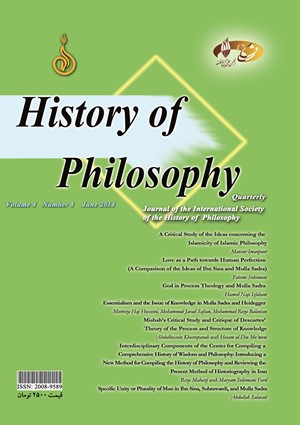-
-
List of Articles
-
Open Access Article
1 - سخن سردبير
Hossein Kalbasi Ashtari -
Open Access Article
2 - A Critical Study of the Ideas concerning the Islamicity of Islamic Philosophy
Mansur Imanpour -
Open Access Article
3 - Love as a Path towards Human Perfection (A Comparison of the Ideas of Ibn Sina and Mulla Sadra)
Fateme Soleimani -
Open Access Article
4 - God in Process Theology and Mulla Sadra
Hamed Naji Isfahani -
Open Access Article
5 - Essentialism and the Issue of Knowledge in Mulla Sadra and Heidegger
Mohammad Reza Balanian -
Open Access Article
6 - Misbah’s Critical Study and Critique of Descartes’ Theory of the Process and Structure of Knowledge
Hesam al-Din Mo’meni -
Open Access Article
7 - Interdisciplinary Components of the Center for Compiling a Comprehensive History of Wisdom and Philosophy: Introducing a New method for Compiling the History of Philosophy and Reviewing the Present Method of Historiography in Iran
Reza Mahuzi Maryam Soleimani Fard -
Open Access Article
8 - Specific Unity or Plurality of Man in Ibn Sina, Suhrawardi, and Mulla Sadra
‘Abdullah Salavati
-
The rights to this website are owned by the Raimag Press Management System.
Copyright © 2017-2026







